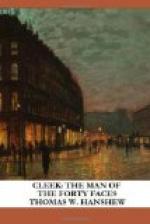“Yes,” he replied; “I make a good deal out of it, Mr. Narkom, but, like the language of the man who stepped on the banana skin, it isn’t fit for publication. One question more, Sir Henry. Heaven forbid it, of course, but if anything should happen to Logan to-night, whom would you put on guard over the horse to-morrow?”
“Do you think I could persuade anybody if a third man perished?” said the baronet, answering one question with another. “I don’t believe there’s a groom in England who’d take the risk for love or money. There would be nothing for it but to do the watching myself. What’s that? Do it? Certainly, I’d do it! Everybody that knows me knows that.”
“Ah, I see!” said Cleek, and lapsed into silence again.
“But you’ll come, won’t you?” exclaimed Sir Henry agitatedly. “It won’t happen if you take up the case; Mr. Narkom tells me he is sure of that. Come with me, Mr. Cleek. My motor is waiting at the garage. Come back with me, for God’s sake—for humanity’s sake—and get to the bottom of the thing.”
“Yes,” said Cleek in reply. “Give Lennard the address of the garage, please; and—Mr. Narkom!”
“Yes, old chap?”
“Pull up at the first grocer’s shop you see, will you, and buy me a couple of pounds of the best white flour that’s milled; and if you can’t manage to get me either a sieve or a flour dredger, a tin pepper-pot will do!”
CHAPTER XIII
It was two o’clock when Sir Henry Wilding’s motor turned its back upon the outskirts of London, and it was a quarter past seven when it whirled up to the stables of Wilding Hall, and the baronet and his grey-headed, bespectacled and white-spatted companion alighted, having taken five hours and a quarter to make a journey which the trains which run daily between Liverpool Street and Darsham make in four.
As a matter of fact, however, they really had outstripped the train, but it had been Cleek’s pleasure to make two calls on the way, one at Saxmundham, where the paralysed Murple lay in the infirmary of the local practitioner, the other at the mortuary where the body of Tolliver was retained, awaiting the sitting of the coroner. Both the dead and the still living man Cleek had subjected to a critical personal examination, but whether either furnished him with any suggested clue he did not say; indeed, the only remark he made upon the subject was when Sir Henry, on hearing from Murple’s wife that the doctor had said he would probably not last the week out, had inquired if the woman knew where to “put her hand on the receipt for the payment of the last premium, so that her claim could be sent into the life assurance company without delay when the end came.”
“Tell me something, Sir Henry,” said Cleek when he heard that, and noticed how gratefully the woman looked at the baronet when she replied, “Yes, Sir Henry, God bless you, sir!” “Tell me, if it is not an impertinent question, did you take out an insurance policy on Murple’s life and pay the premium on it yourself? I gathered the idea that you did from the manner in which the woman spoke to you.”




